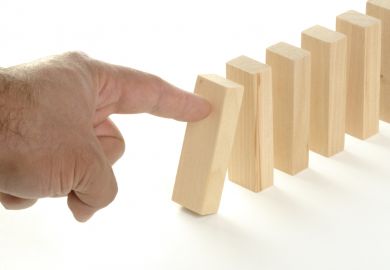Australia is valuing its scientists more at the same time as it rewards them less by cutting their pay, bogging them down in administrative work and leaving them anguished about their future job prospects.
Two reports have added to a growing picture of Covid-19’s toll on researchers. A survey of almost 1,500 scientists has found that one in 20 has ceded pay during the coronavirus crisis and one in 10 has lost working hours, even though about six in 10 believe that Australians now place greater value on science and the scientific workforce as a result of the pandemic.
The survey, by representative bodies Professional Scientists Australia and Science and Technology Australia, also found that almost one in four respondents was experiencing mental distress – with job security a key stressor.
A parallel survey of 333 early- and mid-career researchers (EMCRs) has also highlighted the mental health impacts of the crisis. Respondents expressed anxiety about job uncertainty, competing priorities, childcare and “the well-being of older dependents”.
The strain was pronounced for the almost three-quarters of respondents employed casually or on contracts, many of them female. Women proved twice as likely as men to report that caring responsibilities had grown incompatible with their work obligations.
Carers were forced to catch up with their work on the weekends, complaining that their productivity had been stifled by home-schooling obligations and constant interruptions. Scientists without caring responsibilities, meanwhile, revelled in their largely undisturbed work time at home.
The survey, by the Australian Academy of Science’s EMCR Forum, also found that scientists were enjoying increased flexibility in the workplace, saving time normally spent commuting, learning new skills online and experimenting with workflows and communication.
But such benefits were outweighed by anxiety, reduced research outputs and increased administrative and teaching workloads. “The pandemic will have significant and long-lasting effects on EMCRs into the future,” said Vanessa Wong, the forum’s co-deputy chair.
“Without rapid and continued support by government, employers and funding bodies, there will be mass exodus…leading to a substantial brain drain and lost future capacity to [solve] future challenges – such as the next pandemic.”
The report says laboratory and facility closures disrupted more than half of the respondents’ research. Meanwhile, increased teaching and administrative tasks supplanted activities likely to contribute to their research track records
“This shift in the nature of workload for researchers will raise challenges for universities on how they evaluate staff for internal promotions,” the report says. “Female EMCRs with caring responsibilities and those who reduced their working hours are the most likely to be affected.”
It says funding bodies must “provide clear instructions” on how EMCRs submitting grant applications or progress reports should explain the impact of Covid-19 on their research track records. Researchers, especially those with carer responsibilities, should be allowed to claim a “career disruption” due to the pandemic.
Both surveys were conducted in May, before Australian universities started announcing mass job cuts. Science and Technology Australia chief executive Misha Schubert said that even at that stage, almost one in 20 scientists had been dismissed or stood down without pay.
“Since this survey was in the field, we’ve seen announcements of thousands more job losses at universities,” she said. “Now is the time for a stronger investment in the science and technology workforce.”
Register to continue
Why register?
- Registration is free and only takes a moment
- Once registered, you can read 3 articles a month
- Sign up for our newsletter
Subscribe
Or subscribe for unlimited access to:
- Unlimited access to news, views, insights & reviews
- Digital editions
- Digital access to THE’s university and college rankings analysis
Already registered or a current subscriber?








